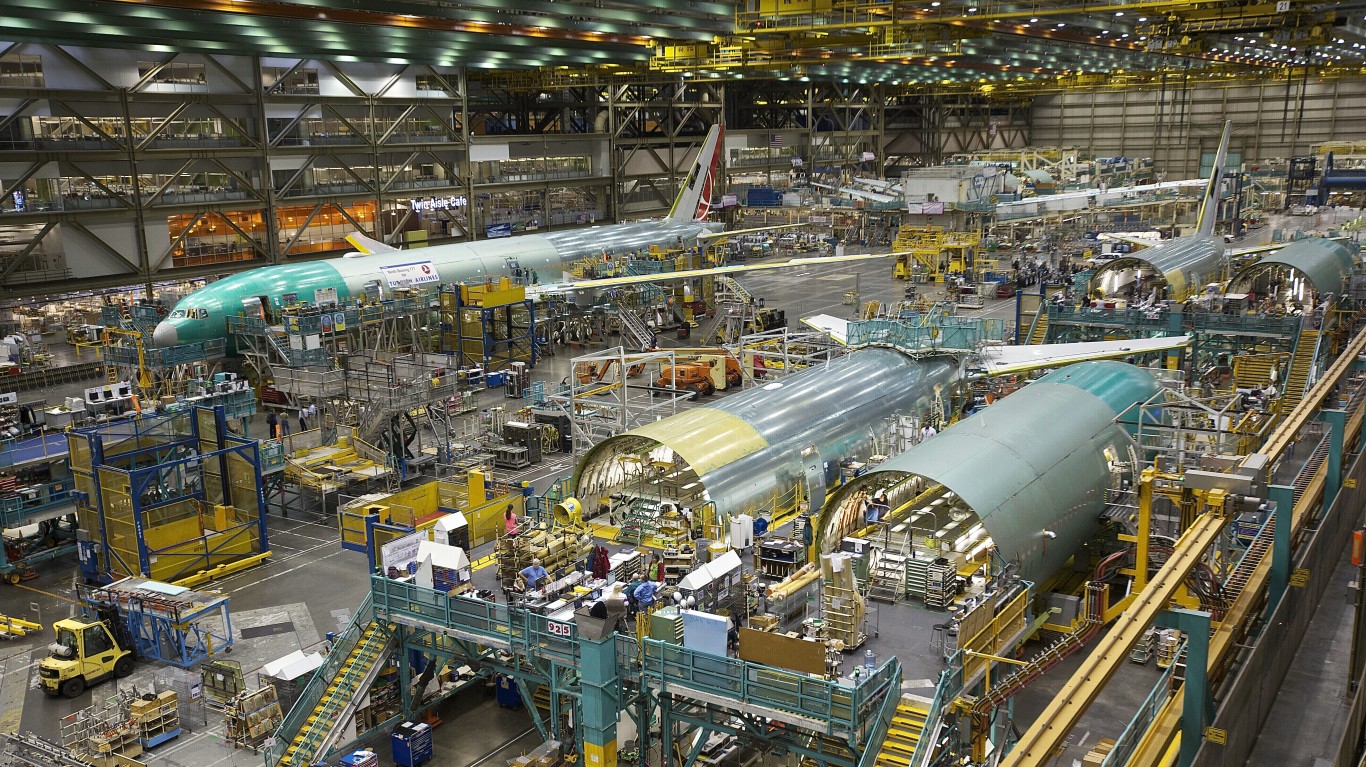
Boeing Co. (NYSE: BA) reported fourth-quarter and full-year 2018 results before markets opened Wednesday. For the quarter, the aerospace company posted adjusted diluted earnings per share (EPS) of $5.48 on revenues of $28.34 billion. In the same period a year ago, the company reported EPS of $5.07 per share on revenues of $24.77 billion. Fourth-quarter results also compare to consensus estimates for EPS of $4.58 and $26.87 billion in revenues.
For the full year, Boeing reported EPS of $16.01 and revenues of $101.13 billion, compared with year-ago EPS of $12.33 and revenues of $94.01 billion. Analysts were looking for EPS of $15.13 and revenues of $99.7 billion.
The number that matters most to Boeing — and to its shareholders — is operating cash flow, and fourth-quarter cash flow totaled $2.95 billion, down sequentially from $4.56 billion but up 2% year over year from $2.9 billion. Operating cash flow totaled $15.32 billion in 2018, up from $13.34 billion in 2017, within the range that Boeing had forecast for the year.
In its outlook for 2019, Boeing forecasts full-year revenues in a range of $109.5 billion to $111.5 billion and adjusted EPS of $19.90 to $20.10. Operating cash flow is estimated in a range of $17.0 billion to $17.5 billion.
Commercial aircraft deliveries are forecast to reach 895 to 905 this year, around 90 more than the 806 planes delivered in 2018. Operating margin in the division is forecast at 14.5% to 15.0%. Military and space revenue is forecast to rise to a range of $26.5 billion to $27.5 billion with an operating margin of more than 11%. Services revenue is expected to rise to $18.5 billion to $19.0 billion with an operating margin of more than 15%.
Chair, President and CEO Dennis Muilenburg said:
Our financial performance provided a firm platform to further invest in new growth businesses, innovation and future franchise programs, as well as in our people and enabling technologies. In the last 5 years, we have invested nearly $35 billion in key strategic areas of our business, all while increasing cash returns to shareholders.
Analysts are looking for first-quarter EPS of $4.12 and revenues of $25.42 billion. For the full year, current estimates call for EPS of $18.31 and revenues of $106.8 billion.
Boeing’s deferred production costs on the 787 program fell to $22.97 billion, down by $610 million sequentially. Tooling and other non-recurring costs for the program also declined, from $2.77 billion at the end of the second quarter to $2.64 billion.
The company’s backlog of commercial jets now stands at nearly 5,900 airplanes valued at $412 billion at contract (not list) prices. The value of the backlog slipped by $1 billion sequentially.
Boeing’s effective tax rate in the quarter was approximately 15.4%, up from 9.5% in the prior quarter. The company’s effective tax rate for the full year was 9.9%, down from 16.3% in 2017. The company forecast an effective tax rate for 2019 of approximately 16%. Boeing’s income tax expense for 2018 totaled $1.14 billion, down from $1.65 billion in 2017.
Besides building more airplanes this year, Boeing is also expected to announce a decision on a new mid-range commercial jet that has been dubbed the 797 by analysts. A decision is likely before June’s Paris Air Show on the twin-aisle, twin-engined jet designed to carry 200 to 250 or so passengers on flights of up to 5,000 nautical miles.
Boeing has said it sees a market size of 4,000 to 5,000 for the aircraft, while most industry analysts and rival Airbus put the market size at around 200 to 2,500. Potential customers also want the plane to cost around $75 million. Boeing would have to sell 2,000 planes just to break even on development costs of around $15 billion.
To say that investors are happy with the Boeing’s performance may be an understatement. Shares jumped about 6% in premarket trading to $386.65, in a 52-week range of $292.47 to $394.28. The consensus price target as of last night was $415.71.
It’s Your Money, Your Future—Own It (sponsor)
Retirement can be daunting, but it doesn’t need to be.
Imagine having an expert in your corner to help you with your financial goals. Someone to help you determine if you’re ahead, behind, or right on track. With SmartAsset, that’s not just a dream—it’s reality. This free tool connects you with pre-screened financial advisors who work in your best interests. It’s quick, it’s easy, so take the leap today and start planning smarter!
Don’t waste another minute; get started right here and help your retirement dreams become a retirement reality.
Thank you for reading! Have some feedback for us?
Contact the 24/7 Wall St. editorial team.
 24/7 Wall St.
24/7 Wall St.
